On the anniversary of Queen Elizabeth’s death, Dr Alex Vickery-Howe wonders if the monarchy can be restructured into a democratic model that genuinely protects our common wealth, in the midst of the global climate crisis.
I’m in love with the Queen.
That’s the running joke among my friends. It started when I was in my early 20s and I defended Her Majesty because she was often – unkindly, I thought – compared to her sister. I needn’t have bothered, as Prince Philip had plenty to say about that comparison. According to the Daily Mirror’s royal correspondent, James Whitaker: “When Philip’s cousin Patricia Mountbatten remarked on Elizabeth’s flawless complexion, the prince joked: Yes, and she’s like that all over.”
Mic drop. Awkward cough.
As news reached Aussieland of Elizabeth II’s passing, I got plenty of texts from friends with joking commiserations… even as I’m typing this, my friend Stevie has just popped up on my phone with a pic of him standing next to a poster of the Queen displayed in what looks to be a shopping centre. I’m 43 now. This gag has been going on for a while.
The death of Elizabeth II did hit me, though. That’s the bizarre thing. When it was announced, I wrestled with conflicting feelings and tried to work out why I was so defensive of someone I’ve never met and who is part of a system I’ve always found anachronistic, at best… or, at worst, elitist and exploitative.
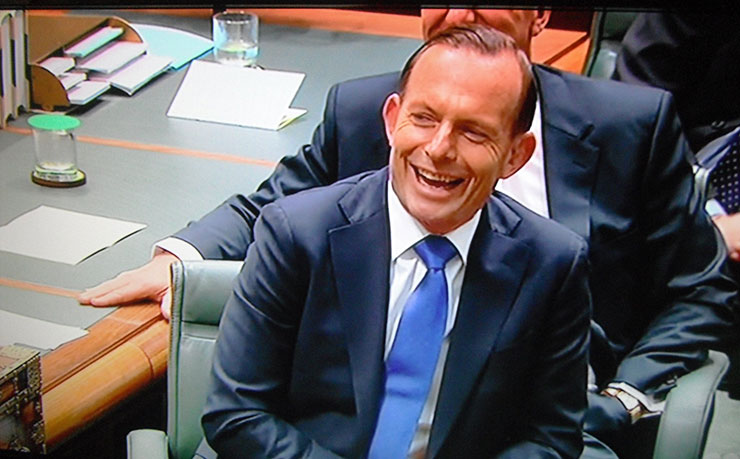
I laughed when Tony Abbott decided to knight a prince. I poke fun at the way my city of Adelaide is obsessed with where people went to school, as if that is an indicative marker of one’s intelligence, achievement or character. I can’t stand any hierarchy that isn’t based exclusively on merit. But there I was valorising a sovereign. Why was I so compelled to present her life on balance?
It’s largely the cheap partisanship that puts me off. The vitriol online from the always tolerant, always virtuous, always ‘caring’ left was nothing short of pathetic. It was the same when Prince Philip died in April 2021, after battling multiple illnesses. I say this as someone who identifies with the left – most of the time – and who votes for the Australian Greens, even when they’re prats. Ethically, I could not abide the opportunistic comments from Adam Bandt, turning a message of condolence into a shameless and dehumanising PR grab. Tactically, too, it just wasn’t politically shrewd. I miss Bob Brown.
I also found myself blocking The Chaser on Twitter for confusing cruelty with comedy. One friend texted to say the Queen was “a piece of work” but couldn’t actually support that comment with anything other than… well, lots of people were saying it, so you’ve gotta join the herd, right?
The celebration of a death always strikes me as vulturish, but it felt particularly mean-spirited and poorly researched when the Queen passed. I’m not actually a monarchist… am I? Sure, I did think the audience with Paddington was cute, and the drone show of the Corgi in the sky was… is it acceptable to say “moving”? Is that what I really think? Who the heck have I withered into? And who can I blame?
My grandmother, Mavis Jean Barker, used to cut out pictures of the royals and frame them in her kitchen. She tried, many times, over strong tea and those old coffee scroll biscuits with pink lolly centres, to impress upon the very young but already quite stubborn me that the monarchy was all for the common good. I didn’t believe her. I still don’t. It became a regular debate whenever she was babysitting and I’m grateful to her for fostering a formative interest in government and politics, even if I took a left turn.
Memories of those early evenings are very sharp. I can picture Mavis (I called her “Gaga” before some ridiculous singer laid claim to that title) in her exquisitely handmade floral dresses, hair set in what I now suspect was a style inspired by the Queen herself, making her case again and again. Barracking for a John Hewson victory. Ironing her Australian flags. Using placemats to explain the Westminster system.
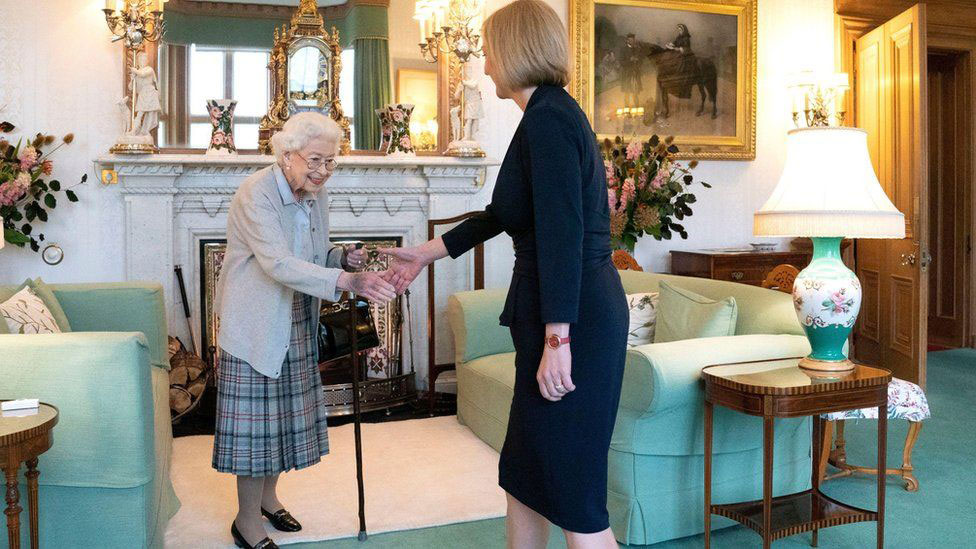
The final public appearance of Queen Elizabeth II – a tiny and fragile woman at the end – smiling as she met with almost-Prime Minster Liz Truss, has somehow blended with my lasting impressions of Gaga. The Queen was terminally ill and performing cheerfulness through that knowledge. She did her duty. There is undeniable nobility in that gesture and that is a nobility removed from, and superseding, all the snooty trappings of royalty.
Whether one embraces her role or derides it, Elizabeth II did the job she was given, and she did it impeccably to the very end. There is something in the bravery, the stoicism, the clarity and the sense of purpose of my grandmother’s generation that I cannot help but be swayed by. Yes, it’s a cliché, and it ages me, but there’s truth to many older perspectives. That’s probably why all the joyous memes and glib one-liners making fun of the Queen’s death leave me cold.
One of the first iconic images of the Queen is from her 21st birthday, 1947, where an almost shockingly young version of Elizabeth II made the vow that she would follow until, literally, her dying day:
“I declare before you all that my whole life whether it be long or short shall be devoted to your service and the service of our great imperial family to which we all belong.”
For many – and I count myself among this group – it is a devotion to a questionable cause and one which carries layers of complexity; nevertheless, her steadfast commitment, and her journey from that idealistic young woman in scratchy black and white footage to elder monarch with bruised hands, supported by a cane, smiling through her ailments, is a journey for which few would have the stomach. It’s a life spent in a gilded cage.
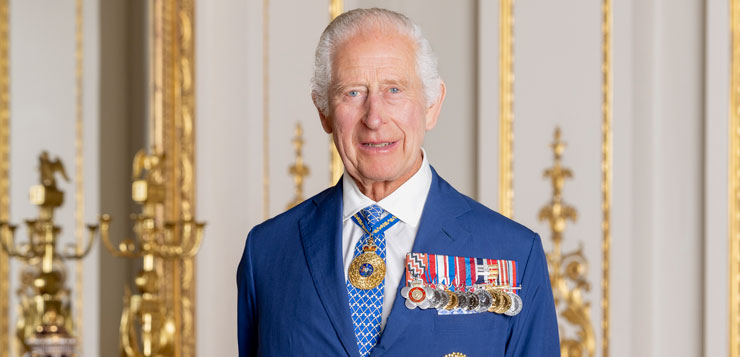
Much has been made of the monarchy as an apolitical institution, brought into sharp relief by the outspoken environmental activism of Prince Charles who has curtailed the most endearing traits of his personal character to become the constitutionally neutral King Charles III. Despite these formal expectations, Queen Elizabeth had her ways of making her politics known and, when she did, it was – paradoxically, some may argue – to further progressive causes.
Elizabeth’s public dance with then-President Kwame Nkrumah of Ghana in 1961 was, as described by Meriem Amellal Lalmas, “extremely avant-garde”. In the combustible social context of the 1960s, this was hardly an apolitical act, and hardly accidental.
Similarly, in 1998, the Queen drove Saudi Arabia’s Crown Prince Abdullah around Balmoral. As recounted by Sir Sherard Cowper-Coles, then ambassador to Saudi Arabia, she wasn’t gentle about it either. She took roads at speed and delivered an unambiguous message:
“His nervousness only increased as the Queen, an Army driver in wartime, accelerated the Land Rover along the narrow Scottish estate roads, talking all the time. Through his interpreter, the Crown Prince implored the Queen to slow down and concentrate on the road ahead.”
In the prince’s home country, women weren’t permitted to drive until 2018. Clearly, the young Queen had feelings about that. Backward? Apolitical? That’s a very, very flimsy argument.
Elizabeth II was indeed a mechanic during the Second World War. Her father, King George VI, was adamant that the young princess forge her career in the military, without privilege. The young Princess Elizabeth became a Junior Commander under her own steam, a role comparable to a Captain in the US military.
Speaking of the US, having directly participated in the global struggle against fascism, one wonders how the Queen felt when duty-bound to meet far-right president and committed douchebag Donald Trump. Her choice of flower brooch – a gift from Barack and Michelle Obama – may be interpreted as a simple acknowledgement of the longstanding military and cultural partnership between the US and the UK… if you squint. But for everyone around the world who appreciates Trump’s notoriously thin skin, the Queen’s chosen accessory read as a more deliberate, more pointed, statement. As power moves go, it was the semiotic equivalent of an F-bomb.
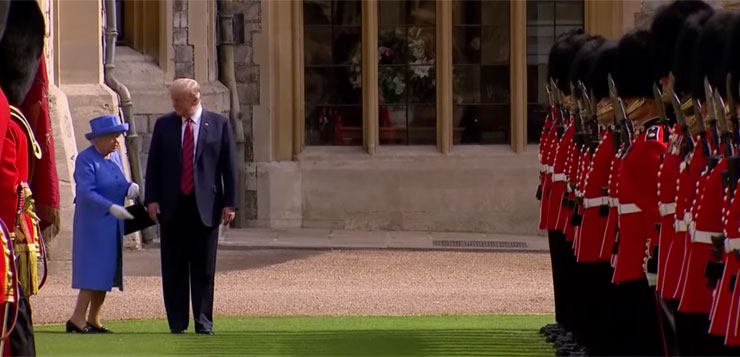
Her clashes with right-wing politicians became a hallmark of her reign, despite official denials. When Margaret Thatcher refused to place sanctions on the Apartheid regime in South Africa, inclined to frame Nelson Mandela as ‘disappointing’ and the African National Congress as a ‘typical terrorist organisation’, the explosive 1986 article in The Sunday Times and, more recently, the fourth season of The Crown (2016-present) depicted a war of wills between the two formidable women.
Domestically too, the Queen allegedly expressed misgivings about Thatcher’s ‘uncaring’ social policies, epitomised by the one-year miner’s strike across 1983-84. Editor Andrew Neil stood by his paper’s depiction of this political clash: “I think what is said in public and what is said in private are two different things and the palace have to maintain their position.”
Some say this is all conjecture. Some say happenstance. I say the monarchs’ dilemma that one must remain dispassionate, at least publicly, naturally leads to the use of subtle gestures.
A woman accustomed to exercising power through symbols, the Queen often communicated via the position of her handbag. She would be keenly aware, therefore, of how a choice of brooch would be received across the globe.
Likewise, it stretches credulity to imagine that her chosen attire during the parliamentary opening of 2017 (bel0w) was only ‘co-incidentally’ representative of the European Union…riiight…
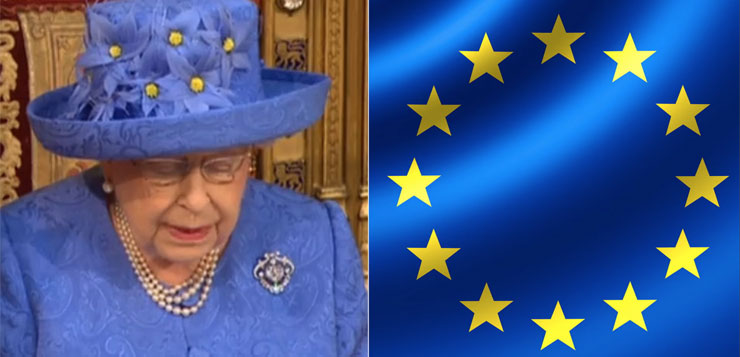
The truth of these and other controversies may not ever be revealed until her private journals become public, which may not occur for decades. Her father and grandfather’s diaries have yet to see the full light of day.
With Charles in charge, the political statements may finally become less veiled. Positioned within, say, the bitter climate debate still inexplicably raging in the US, the King’s pro-green, pro-interventionist views could be seen as radical – even ‘Marxist’ – on some fallow corners of the internet. Might we be looking at a future where the monarchy is criticised for being too progressive? Wouldn’t that be weird!
On the other hand, the Queen was an avid hunter and I sure ain’t no fan of that… she once posed with a dead tiger, for crying out loud. This horrifies me. She bred shooting dogs. She killed deer. She killed hares. She killed foxes. She bludgeoned pheasants to death. For someone who grew up on a hobby farm where every animal died of old age, this is an affront to my core values.
And then we need to look at the wider institution….
The Commonwealth is built on a bloody history of colonialism. It is fundamentally classist and abhorrent. This horrifies me a great deal more. Professor Kehinde Andrews captured it best:
“Britain likes to pretend that it was honest hard work and scientific genius that made the nation ‘great.’ But in reality, it was genocide, slavery and colonialism that propelled a small island nation into a global leader.”
It would be offensively naïve to claim – as some conservative politicians and commentators do – that the contemporary monarchy can wash the blood from its gloves. It can’t. The monarchy is stained.

Yet, timorously, I argue that Gaga did have a case: the system works in terms of global security, the spread of democratic norms, both technological and social progress, and a sense of shared ambition that is not, as we’ve seen since the Queen left us, entirely based on ‘Cool Britannia’ rhetoric or misty-eyed sentiment. There is something deeper that is worth talking about.
Consider the countless charitable causes that are supported and promoted by the royal family: the Prince’s Trust, the Duke of Edinburgh’s International Award, Save the Children and Riders for Heath, to name a few. Consider, above all, the Queen’s Commonwealth Canopy, Her Majesty’s defining legacy, which has seen the vast majority of Commonwealth nations commit to environmental conservation in practical terms.
The brainchild of Lord Field of Birkenhead, the Canopy program was dead in the water until it received enthusiastic support from the monarch. Using the Commonwealth network, and what David Attenborough describes as the Queen’s “soft power”, this initiative has resulted in genuine global cooperation towards replenishing forests and fighting climate change.
Attenborough’s endorsement is no small thing. Even the mouthiest greenies, like myself, would have to admit that this kind of planet-spanning effort would not have been possible without a sovereign prepared to lead it. In this respect, the Commonwealth – described by Prince Philip on Meet the Press in 1971 as a ‘remarkable ideal’ and ‘a club’ made up of different people from disparate racial origins and faiths – is akin to a global collective government. Adam Bandt, ironically, has advocated for precisely this. The Australian Greens believe, sensibly, in global solutions to the major issues affecting our world. The Queen didn’t just whine about it; she actually walked that walk.
More confidently, I argue that collectivism and interconnectivity are the strengths of the Commonwealth. They have led to concrete progress. If it can be moved beyond hereditary titles and hoarded fortune, there is something to be salvaged from the notion of a collective focal point around which disparate nations can concentrate their shared energies. When it comes to the climate emergency, in particular, the peoples of the world cannot afford to be fractured.
The Pythons asked: “What have the Romans ever done for us?” Nothing, besides the aqueduct, sanitation, the roads, irrigation, medicine, education, public health…. There is some truth to that old gag. There are also a lot of sins it conceals. But where does it leave us?

In Australia, it is past time to make amends with the traditional owners of our lands, as Senator Pat Dodson, the Honourable Linda Burney, Stan Grant, Edward Synot and others have eloquently highlighted. The Voice to Parliament didn’t pass, but it should have. The treaty promised by Bob Hawke proved to be as tangible as Trump’s phantom healthcare plan, and we’re a poorer nation for it. All of this must be addressed.
These are, however, our own, homegrown Aussie failures. It’s time Australians stopped blaming Britian for the progress we are choosing not to make.
The Queen was never responsible for our inability to get things done or our refusal to treat traditional owners with kindness and respect. Neither is the new King. We broke our own promises.
On this anniversary, I acknowledge how far we have to go, just as I acknowledge our brutal history. But, even as a leftie, even as a republican, I’m unable to look at any debate, any human being, in absolute terms.
It may be read as foolish, blinkered, a character flaw, an unresolvable contradiction, a psychological inconsistency, but….
I still can’t help but honour Gaga and her placemats.
The post Loving Liz: Confessions Of A Monarchist Republican appeared first on New Matilda.
This post was originally published on New Matilda.